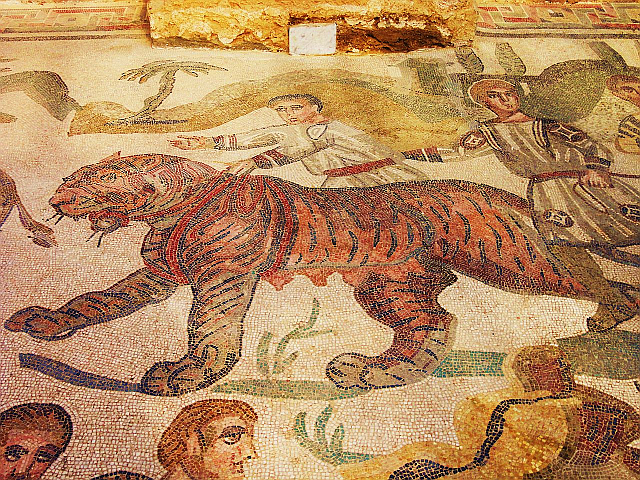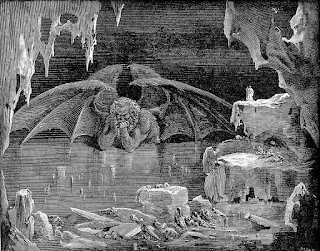(One paragraph was revised on 10.1.17, as noted)Paradiso 29:1-12
Quando ambedue li figli di Latona,
coperti del Montone e de la Libra,
fanno de l'orizzonte insieme zona,
quant' è dal punto che 'l cenìt inlibra
infin che l'uno e l'altro da quel cinto,
cambiando l'emisperio, si dilibra,
tanto, col volto di riso dipinto,
si tacque Bëatrice, riguardando
fiso nel punto che m'avëa vinto.
Poi cominciò: “Io dico, e non dimando,
quel che tu vuoli udir, perch' io l'ho visto
là 've s'appunta ogne ubi e ogne quando.
. . .
At what time both the children of Latona,
Surmounted by the Ram and by the Scales,
Together make a zone of the horizon,
As long as from the time the zenith holds them
In equipoise, till from that girdle both
Changing their hemisphere disturb the balance,
So long, her face depicted with a smile,Alison Cornish does a marvelous job explicating this passage in her article entitled "Planets and Angels in Paradiso XXIX: The First Moment." The elaborate spatial architecture is both an image of balance and a figure of instantaneity -- of the nothing that is the nevernow between one instant and the next.
Did Beatrice keep silence while she gazed
Fixedly at the point which had o'ercome me.
Then she began: "I say, and I ask not
What thou dost wish to hear, for I have seen it
Where centres every When and every 'Ubi.'
Cornish sorts out the ambiguities and equivalences arising out of the astronomy, then with great perspicacity relates the passage to what comes after it -- the account of the creation of the angels and their fall. The nature of time as it derives from celestial motion turns out to be integral to a long and significant interpretive tradition of the timing and manner of that fall.
Augustine and Aquinas grappled with the question of the first instant of the angels' existence, and how it came to pass that these first creatures both became self-aware and, seemingly without delay, exercised their will once and for all either to remain faithful to their Creator, or to turn away.
Cornish teases out her reading with formidable learning and delicacy. Without straying from her analysis, she provides insights into Augustine and Aquinas' somewhat abstruse thinking about time and angelic consciousness. Indeed, the question of how long the rebellious angels remained unfallen seems to require Aquinas to distinguish angelic time from celestial time. The essay is a tour de force.
I'll try to add a couple of "grace notes" to Cornish's interpretive work, deriving from two elements built into the passage that were not her focus: the classical resonances of the figure of Latona, and Dante's structuring use of quando, which begins and ends the passage.
The passage paints an image of equilibrium that's a mini-summa of the ancient world. The embattled mother of Apollo and Artemis, the zodiacal references, the symmetrical structure of the equinox, the crepuscular moment between day and night, the thresholds of spring and autumn are all rooted in the world of Aristotle and Virgil, a Cosmos precariously poised between opposing forces that seem equally matched. Libra invokes the balance of Justice and judgment -- think of Zeus holding the scales above the world of men -- as well as the delicacy of Euripides' Sophrosyne, the sound self-control of the well-balanced soul.
Of course the "balance" is eternally elusive. Cornish rightly notes that the "when" of the passage has no duration in time, any more than a point has any extension in space. Dante has painted an elaborate image that extends through time to speak of a quando ("when") that has no measurable time at all.
The classical model is a symmetrical system of binary oppositions whose mirror-like ambiguity is thorough and undecidable. As Cornish, Hollander and others point out, it's impossible to tell which child of Latona is under which sign. If Apollo/Sun is found under Aries (Montone, interestingly, seems to be a wether rather than a ram) Spring is dawning in Rome. At the exact same moment, with the Artemis/moon under Libra, Fall is deepening into dusk in the antipodes. (If the Sun is under Libra, all this is reversed.) Total equilibrium is both a model of specular symmetry, and in this celestial configuration, the precise moment of eclipse.
 |
| From Cornish, "Planets and Angels" |
Why Latona?
As already noted, the latter part of Cornish's essay addresses the theology of the angels' creation and fall, and it is very rich. But the classical elements of the passage (which, by the way, is not a simile, but a portrait of a celestial position used to elicit the duration of Beatrice's "painted" smile) are not mere window dressing. Why is this story invoked here?
Leto or Latona is the goddess of motherhood, who undergoes extremities of parturitive labor. Jealous Hera decrees that the modest goddess, impregnated by Zeus before Hera became his spouse, will not be allowed to bring forth children on earth or sea. Latona seeks a refuge where she might safely bring her children into the world. The myth spares nothing in detailing her search:
The floating island of Delos, neither earth or sea, eventually becomes the sacred locus, the opening for Latona to give birth to her twins.In her wanderings, Leto came to Crete, to Athens, to the island of Aegina in the Saronic Gulf, to Athos in Thrace, to Mount Pelion in Thessaly, to the Aegean island of Samos off the western coast of Asia Minor, to the island of Peparethus north of Euboea, to Mount Ida, to the city of Phocaea in Asia Minor which is between the Elaitic and the Hermaean Gulfs, to the island of Imbros in northern Aegean Sea, to Lemnos, to the island of Lesbos in the Aegean Sea opposite the coast of Asia Minor, to the island of Chios off the coast of Ionia in Asia Minor, to Mount Mimas opposite Chios, to the rock Corycius on the coast of Asia Minor in Cilicia, to Clarus near Ephesus, to the promontory Mycale in Ionia on the mainland opposite Samos, to Miletus in Caria, to Cos off the southwestern coast of Asia Minor, to Cnidos, Naxos, Paros, and many other lands, looking for a place to give birth.
Apollo protects Leto from Tityus
It's hardly by chance that this tale of labor, persecution and escape is evoked here, just before an account of serene divine creation that takes "place" outside of time, space, pregnancy, and labor. When contemplated together, the manifold differences between these two accounts are mutually illuminating.
Both treat of divine making, and the "children" in both accounts are immortal. The tale of Latona stresses the delay, the impedance blocking her infants from coming forth at the natural time. According to the logic of the passage, inhibiting the twins' birth would be nothing less than the simultaneous eclipse of both sun and moon!
Beatrice's description of the creation of the Angels couldn't be more different. There is nothing of labor there, nothing of embryonic development and birthing, no mechanism or natural process to account for the act. A"splendor" is put into the world from a place outside of the world -- a speaking, self-aware being:
Non per aver a sé di bene acquisto,
ch'esser non può, ma perché suo splendore
potesse, risplendendo, dir 'Subsisto,'
Not to acquire some good unto himself,The first act of this new, limitless legion of unique beings is an act of intelligence: each enunciates its being. The creature does not say "I am happy," or "I love corned beef," or "I vote for Satan." The first moment is not seeing, or loving, or desiring, or willing. It's the act of saying subsisto.
Which is impossible, but that his splendour
In its resplendency may say, 'Subsisto,' (Par. 29:13-15)
In Italian, sussistere seems to suggest simple being: to exist in oneself. The Latin form, subsistere, tends to a wider range of meanings, including but not limited to: to take a stand, to stay, to subsist, to withstand, to stand firm, to sustain, to halt, to oppose, to exist under some larger entity. The prefix "sub" seems to promote a sense that one's standing, or remaining, is in relation to something else. Not just standing, but withstanding.
The distinctive feature of a reflection is precisely its derivative nature: entirely dependent upon an other, it doesn't speak, let alone demonstrate intelligence of existence. Here, each splendor, complete with vocabulary, grammar, syntax, phonemes and voice, speaks. Saying "I am" presumes articulation. A direct intuition of existence might need nothing -- it can exist in itself (sussitere). But to be able to speak this knowing presumes features of grammar, syntax, phonemes -- a complex, shared set of rules that it uses but does not create. In saying "I am," a knowing being puts itself instantly into the world. But something other than itself is inextricably necessary to that self-positing. (This paragraph was revised 10.1.17.)
As an aside: The "when" of the angels' choice to stand or fall is understood to be distinct from this moment. Citing Aquinas, Cornish says this distinction might be not temporal, but logical. The point here is simply that Beatrice is quite clear that in this prime moment, a being is articulating its being. This "precedes" (logically or ontologically) all else, including light. As we'll see in a moment, it happens on the cusp, in twilight, the exquisitely poised balance between day and night upon which the Latona passage turns.
Beatrice moves seamlessly from this originary moment to the threefold creation of the world:
così 'l triforme effetto del suo sire
ne l'esser suo raggiò insieme tutto
sanza distinzïone in essordire.
So from its Lord did the triform effectThe highest sustanze, pure act, are put there totum simul with mere matter (pure potentiality) and the world of matter and form (what we see). In that raggiò, the whole scala of creation was given, from formlessness through the physical universe to quadrillions of sustanze saying "subsisto."
Ray forth into its being all together,
Without discrimination of beginning. (29:28-30)
The text's description of a total, instantaneous act gains power from contrast with the nearly unending labors of Latona, whose difficulties don't cease even after she's given birth.
The angels' choice to stand or fall is given a thorough going-over by Cornish. I will just note an interesting intratextual gloss that comes earlier in the canticle, as it relates suggestively to the "when" of the Latona passage: In Paradiso 19, the Eagle is expatiating on the theme that no degree of perspicacity will enable creatures to see all, and says:
This can only be the moment that Beatrice has been speaking of, here played out with the figure of Satan, who -- in the precarious twilight before he could know whether what was coming was the darkness or the light -- didn't wait to see, and so fell into eclipse without end. It's also the moment in which Paradiso 30 begins.E ciò fa certo che 'l primo superbo,And this makes certain that the first proud being,
che fu la somma d'ogne creatura,
per non aspettar lume, cadde acerbo;
Who was the paragon of every creature,
By not awaiting light fell immature. (Par. 19:46-48)
The figure of Niobe, disdainer of Latona, is treated in the following post.



